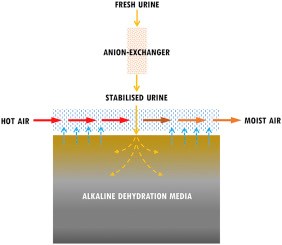In urine-separating sanitation systems, bacterial urease enzymes can hydrolyse urea to ammonia during the pipe transport and storage of urine. The present study investigated whether it was possible to reduce the urine volume without losing the nitrogen as ammonia. A method for stabilising the urine prior to dehydration was developed.
Briefly, fresh human urine was stabilised by passage through an anion–exchanger, added to an alkaline media (wood ash or alkalised biochar), and dehydrated. Urine dehydration was investigated at three temperatures: 40, 45 and 50 °C. The influence of various factors affecting the dehydration process was modelled and the rate of urine dehydration was optimised. Results indicated that 75% (v/v) of the urine has to pass through the ion–exchanger for alkaline stabilisation of urine to occur. At all investigated temperatures, the dehydrator accomplished >90% volume reduction of ion–exchanged urine, > 70% N retention and 100% recovery of P and K. To realise high degree of nutrient valorisation, this study proposes combining source–separation of human urine with alkaline dehydration.
